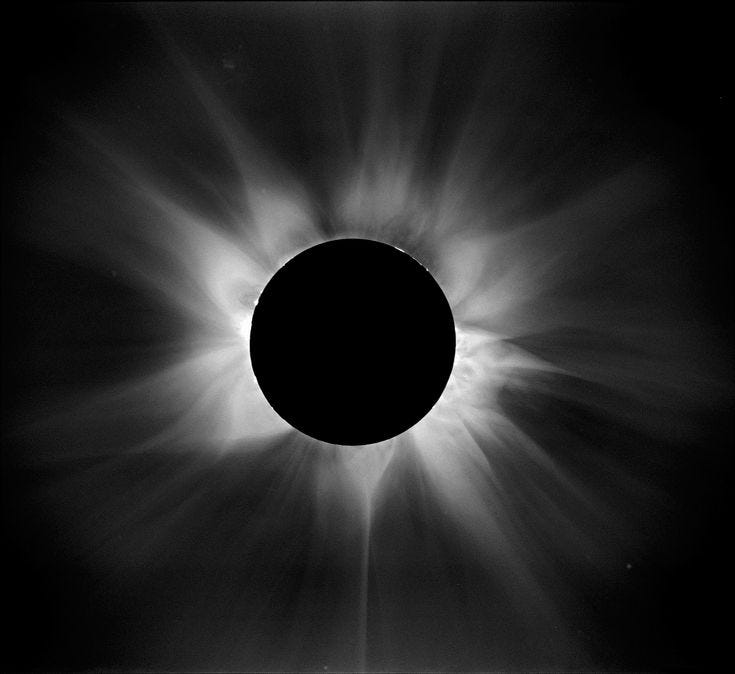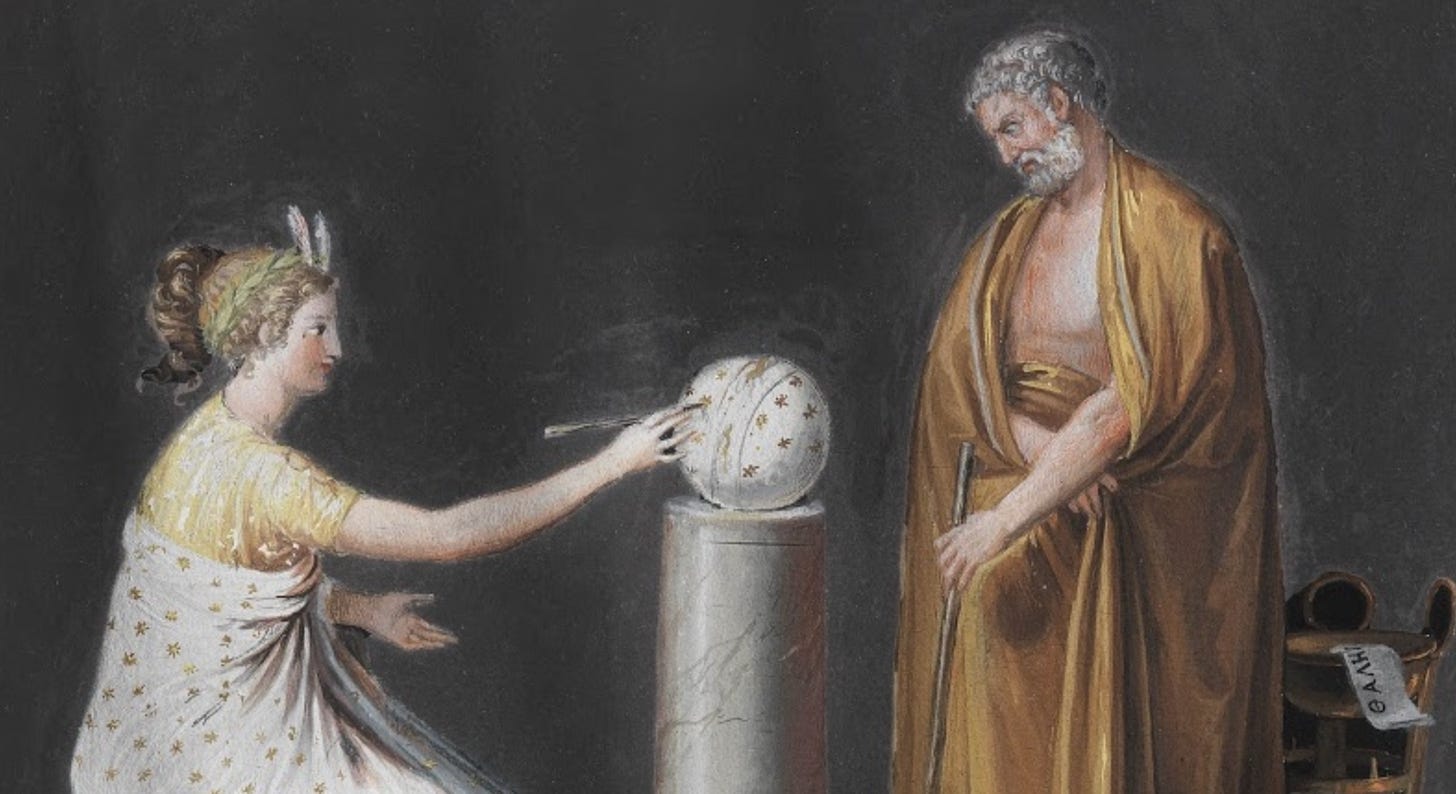Dear Classical Wisdom Reader,
“What has been will be again,
What has been done will be done again;
There is nothing new under the Sun.”
-Ecclesiastes 1:9
It turns out, there’s nothing new between us and the Sun either.
As folks across America and Mexico get their special specs and pinhole papers out for today’s incredible event - an eclipse that has been highly anticipated for its additional stellar corona flare - we’d like to take a moment to appreciate some of the amazing eclipses that have come before.
Their occurrence was a spectacular event in the ancient world. Often interpreted as omens or portents, they have stopped wars, made gods and for humble history lovers ever since, critically dated chronologies. Indeed, it is through this natural astronomical happening, the moment the Moon passes between Earth and the Sun, that the stuff of myths and legends become solid and real... or at least they get a date when they were supposed to have happened.
So today, I’m going to give you a quick recap of the most important recorded eclipses of the ancient world... Please let me know what you think in the comments below... and of course feel free to show your appreciation of our ancient history with a like and share alike.
And for all you up north and in the eclipse’s route, lucky you! May you have clear skies and ISO 12312-2 glasses. Share your pics!
All the best,
Anya Leonard
Founder and Director
Classical Wisdom
P.S. Classical Wisdom Members, a quick note to say we’re ever grateful for your generous support. As mentioned above, Classical Wisdom is an entirely independent, reader-supported publication.
So if you’re enjoying our work, and would like to help support the project, please consider joining our growing community of classics lovers:
The Best Eclipses of the Ancient World
by Anya Leonard
October 22nd, 2137 BC - Ho and Hi, the Drunk Astronomers
Like many great stories that begin in the ancient world, this one may be (read: probably is) apocryphal. Apparently a pair of drunk astronomers were spending too much time imbibing and not enough time foreseeing and were consequently beheaded by the legendary Chinese king Zhong Kang for their failure to predict the blocking out of the sun... Granted, there was confusion and panic among the people, so Zhong Kang sent the nobleman Yin to punish the Ministers of Astronomy. Their neglect was preserved for prosperity as thus:
Here lie the bodies of Ho and Hi
Whose fate though sad was visible,
Being hanged because they could not spy
Th'eclipse which was invisible.
—Unknown Author (2137 B.C.E.)
May 3rd, 1375 BC - Ugarit Eclipse
Fortunately the Babylonians blamed the sun instead of their astronomers, as attested by early Mesopotamian records:
"On the day of the new moon, in the month of Hiyar, the Sun was put to shame, and went down in the daytime, with Mars in attendance."
They noted three cycles of the moon:
Synodic month—new Moon to new Moon
Anomalistic month—perigee to perigee (closest point between Earth and Moon)
Draconic month—node to node (same point in celestial longitude)
...and with 900 years worth of data, they were able to deduce that the three cycles line up every 6,585 days, meaning that they could predict that a solar eclipse -with more or less accuracy- would repeat itself every 18 years.
June 24th, 1312 BC - Mursili's Eclipse
Now, this one is pretty cool because it potentially provides an absolute chronology of the Hittite Empire within the ancient Near East. Mentioned in a text dating to the tenth year of Mursili II’s reign, the records say that "the Sun gave a sign" (istanus sakiyahta), just as the king was about to launch a campaign against the Kingdom of Azzi-Hayasa in north-eastern Anatolia.
Granted, scholars aren’t convinced if it was the smaller annular eclipse (where the sun looks like a ring, rather than being blacked out) in the 13th of March 1335 BC, 24th of June 1312 BC (the same time as the proposed date for the death of Tutankhamun), or another annular eclipse in 1308 BC. But once we know (will we know?) then we’ll really know...
June 15th, 763 BC - The Assyrian Eclipse
This eclipse makes the list because it’s another historical anchor. Indeed, its record is one of the crucial pieces of evidence for the “absolute” chronology of the ancient Near East for the Assyrian period. As found in The Assyrian Chronicles: "[year of] Bur-Sagale of Guzana. Revolt in the city of Assur. In the month Simanu an eclipse of the sun took place."
But -and this is always a rare gem in the ancient world- there’s more! This one is also “confirmed” by the third of the minor twelve prophets in the old testament. Amos, who uses the eclipse as a prophecy of doom, and exhorts Judeans to repentance, write: “In that day,” declares the Sovereign LORD, "I will make the Sun go down at noon, and darken the Earth in broad daylight” (The Bible, Amos 8:9)
May 28th, 585 BC - The Battle of the Eclipse/The Eclipse of Thales
This is most certainly my favorite eclipse of all time... I know, I know, I shouldn’t have favorites. This should be objective ancient eclipse reporting... right?
Well, not only did it stop a six year war, it was also considered the earliest on record as being known in advance of its occurrence (Sorry Ho and Hi, no beheadings were necessary). One of the seven sages of Ancient Greece, Thales of Miletus, accurately predicted this eclipse, making it a moment described by Issac Asimov as “the birth of Science.”
We don’t know how he did it (perhaps he studied the cycles from the Babylonians?), but this was attested by Herodotus, as well as Diogenes Laërtius, who says that Xenophanes, who lived in the same century as Thales, was impressed with the prediction. There are additional testimonies from the pre-Socratics Democritus and Heraclitus.... And it was mentioned by both Cicero and Pliny the Elder.
Either way, Thales’ ability to do so garnered him a lot of respect, indeed, many thought he was a god!
Prediction aside, the actual moment of the eclipse was also remarkable. Day turned into night when the Lydians and the Medes were engaged in an indecisive battle at the Halys River in modern Turkey. The sight was so astounding, the two armies halted their fight and negotiated a peace treaty. In the words of Herodotus:
“As, however, the balance had not inclined in favour of either nation, another combat took place in the sixth year, in the course of which, just as the battle was growing warm, day was on a sudden changed into night. This event had been foretold by Thales, the Milesian, who forewarned the Ionians of it, fixing for it the very year in which it actually took place. The Medes and Lydians, when they observed the change, ceased fighting, and were alike anxious to have terms of peace agreed on.” (Herodotus, History I, 74)
More Battle Eclipses
Now, battle eclipses are a somewhat recurring event. Obviously it doesn’t illustrate the multitude of eclipses, but rather the plentiful nature of war.
After the somewhat dubiously named “Father of History” reported the 585 BC eclipse in his Histories, Spartan fanboy Xenophon described one on the 19th of May 557 BC during the Siege of Larisa. "...A cloud, however, overspread the sun and hid it from sight until the inhabitants abandoned their city; and thus it was taken." (Xenophon, Anabasis)
Herodotus also commented on an eclipse occurring prior to Xerxes' first march against Greece, in 478 BC, saying: "...while he was offering sacrifice to know if he should march out against the Persian, the sun was suddenly darkened in mid sky” ( Herodotus, History, IX)... but unfortunately this one can’t be corroborated by science.
At this point, we can we can turn to the “Father of Real History”, Thucydides, who also writes about one on August 3rd, 431 BC when none other than the great athenian general Pericles demonstrates to his Greek Army that the eclipse was not much more than a covering of the sun by something bigger than his cloak.
As a stark reminder of how long war takes, we can note an additional eclipse in the 8th Year of Peloponnesian War: "In first days of the next summer there was an eclipse of the sun at the time of new moon, and in the early part of the same month an earthquake." (Thucydides, The History of the Peloponnesian War).
Of course the history of eclipses does not end with this list of ancient occurrences, on the battlefield or elsewhere... one was reported during the crucifixion of Christ (not certified) another a by later Roman astrologer, British plague sufferers commented on one and a solar eclipse took place on January 27th, 632 over Arabia during Muhammad's lifetime when his son passed away.
Suffice to say, the presence of this natural astronomical event has been incredibly important to history, as a symbol and an omen to which its observers responded, or as an important record in which we can take the words and myths from history and pin them firmly (almost) to a moment in time.
I’d like to end with a few more historic eclipses, honorable mentions if you will, whose descriptions inspire, confound and cause fear. A reminder that when we are witness to nature’s remarkable feats that there is nothing new under the Sun (including the moon’s passing itself).
Honorable Mentions:
5 June 1302 BC - Early Chinese Eclipse: Chinese writings of the Shang Dynasty report, "Three flames ate the sun, and big stars were seen."
16 Apr 1178 BC - Odyssey Eclipse: Where would a list be of ancient happenings without a bit of Homer? In Book 20, line 345 of the Odyssey, one could conceivably argue an eclipse was ‘recorded,’ ". . . and the Sun has perished out of heaven, and an evil mist hovers over all." I’ll let you ponder that one...
21 Apr 899 BC - China's 'Double-Dawn' Eclipse: Found in the ancient Chinese chronicles, The Bamboo Annals, it was described: "During the first year of the reign of King Yi, in the first month of spring, the sun rose twice at Zheng."
6 Apr 648 BC - Archilochus, the Greek Poet, wrote:
"Zeus, the father of the Olympic Gods, turned mid-day into night, hiding the light of the dazzling Sun; and sore fear came upon men."
"Nothing can be surprising any more or impossible or miraculous, now that Zeus, father of the Olympians has made night out of noonday, hiding the bright sunlight, and . . . fear has come upon mankind. After this, men can believe anything, expect anything. Don't any of you be surprised in future if land beasts change places with dolphins and go to live in their salty pastures, and get to like the sounding waves of the sea more than the land, while the dolphins prefer the mountains."







Excellent article, Anya! 😊🌞🌑
Loved this! Especially this oh-so-modern sounding description, like a wedding column in the NYT: "On the day of the new moon, in the month of Hiyar, the Sun was put to shame, and went down in the daytime, with Mars in attendance."